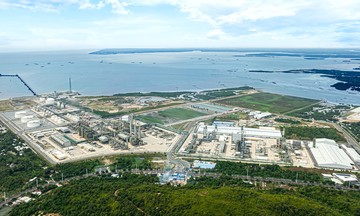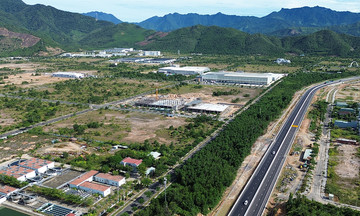Vietnam's stock market continued its positive trend in august. The VN-Index, the market's benchmark index, rose 128 points to 1,230 points at the close of trading on 15/8, an increase of 8.5%.
However, according to statistics from the Ho Chi Minh City Stock Exchange (HoSE), foreign investors have net sold approximately 23.4 trillion VND since the beginning of august. Currently, over 95% of foreign investors' funds in Vietnam are disbursed on the HoSE.
From the beginning of the year, foreign investors have net sold about 56.3 trillion VND, equivalent to over 2.2 billion USD. This figure is only lower than the net withdrawal in 2021 and 2024.
A significant factor in the large net selling by foreign investors is the divestment from Vingroup by SK Investment, an investment fund from South Korea. Between 4/8 and 8/8, SK sold over 12 trillion VND worth of VIC shares through block deals.
According to Vingroup, this activity is part of SK's previously announced global portfolio restructuring strategy. The South Korean corporation also stated that early august was an opportune time to sell VIC shares, as the stock had more than doubled since the beginning of the year.
Besides VIC, FPT was the second most heavily sold stock by foreign investors, with 4 trillion VND sold in the past two weeks. Meanwhile, VPB was the most bought stock by this group, with a net purchase of up to 742 billion VND.
Nguyen Anh Duc, CEO of Institutional Brokerage and Investment Advisory at SBB Securities (SBBS), suggested that the selling by foreign investors came after a period of substantial net buying in July, nearly 7 trillion VND, following news of the US imposing a 20% import tax on Vietnamese exports.
In addition, according to an SBBS expert, foreign investors' profit-taking needs also increased as the Vietnamese stock market has risen nearly 52% since the beginning of April. Meanwhile, the VN30 index – a basket of large-cap stocks favored by foreign investors – has increased by 57.2%.
The short-term price increase potential of many stocks has decreased after the sharp 4-month correction. Therefore, the demand for new purchases by foreign investors has cooled. Several stocks in the VN30 group, such as SSI, VIC, VPB, and TCB, have doubled since April.
Nguyen Anh Duc also observed that foreign investor capital has shifted to emerging markets that have not yet seen strong price increases, such as Thailand and Taiwan, with a significant inflow of funds into these two markets recently. Thailand's stock market has decreased by 10% compared to the beginning of the year, while Taiwan's has increased by 4.9%, whereas the VN-Index has increased by 28.7% after eight months.
However, according to analysts, Vietnam still has opportunities to attract more capital from foreign investors after the stock market is upgraded. Vietnam's stock market is classified as a "frontier market" by FTSE Russell, a global index provider and rating organization, and is being monitored for a potential upgrade to "emerging market" status. Last month, Finance Minister Nguyen Van Thang said Vietnam would soon meet FTSE Russell's upgrade criteria.
Upgrading the stock market is a major goal that the government is aiming for. Improving its status will be a significant boost for Vietnam's capital market, increasing its accessibility to foreign investors.
Tran Hoang Son, Market Strategy Director of VPBank Securities Joint Stock Company (VPBankS), estimates that capital inflows into the Vietnamese market will be around 3-7 billion USD when the upgrade decision takes effect. If foreign investors disburse funds in a short period, it will create a huge boost for the market.
According to SSI Securities, Vietnam's stock market could attract about 1 billion USD from ETF funds thanks to the upgrade, not including active funds. Vanguard FTSE Emerging Markets ETF alone – the largest fund on the market today – is forecast to disburse over 363 million USD.
Trong Hieu












